“The potential of temple food will spread around the world”
Le Cordon Bleu London’s Culinary Arts Director Chef Emil Minev’s Templestay
Text by. Editorial Staff Photo by. Ha Ji-kwon & Shin Yong-hun
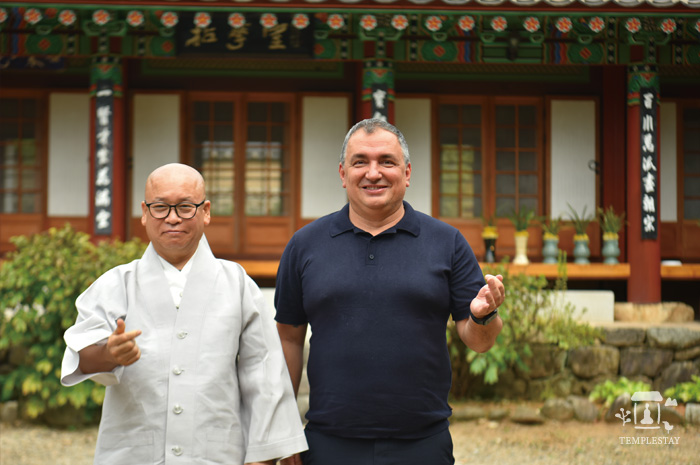
Le Cordon Bleu London’s culinary arts director, Chef Emil Minev, recently stayed at a few Korean temples where he experienced traditional Buddhist culture and temple food. His visit to Korea was made possible by an invitation from the Cultural Corps of Korean Buddhism (hereafter “the Corps”). He was here for approximately six days (September 1st to 7th), and his visit took the form of a familiarization tour based on the theme “temple food.” He visited traditional temples such as Jinkwansa, Baekyangsa, and Cheonjinam. As Chef Minev was the first person to establish the Le Cordon Bleu Diploma in Plant-Based Culinary Arts course in 2021, expectations are high that his experience at Korean temples will serve as an opportunity to instill more of the essential philosophy and values of temple food into future cooking courses conducted overseas.
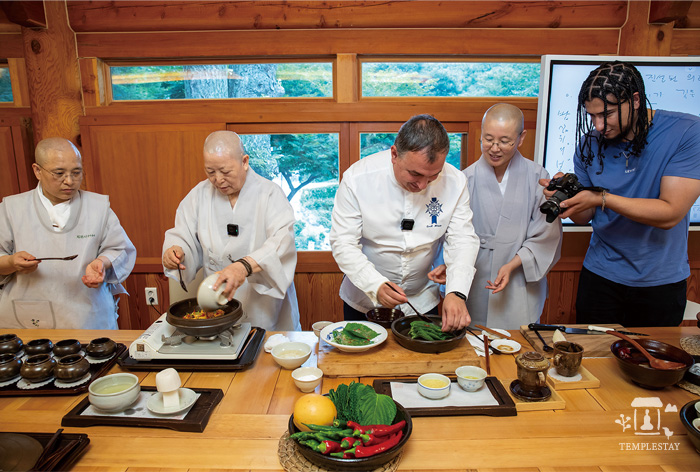
About his experience here, Chef Minev said: “It was truly an amazing experience. First of all, I was glad to be invited to these beautiful traditional temples in such a blessed environment. It was also a meaningful experience to meet the wonderful Buddhist nuns who make temple food. Above all, even though they cooked simply using simple ingredients, the final product was elegant. Overall, I have to say that it was a very special and precious time.”
During Chef Minev’s busy schedule in Korea, he had a series of impressive meetings. On September 2nd, he arrived at Baekyangsa Temple in Jangseong and began his official schedule with a tea ceremony with the abbot, Ven. Mugong. He then visited Cheonjinam Hermitage on the same day, Yeongseonsa Temple in Daejeon on September 3rd, and Jinkwansa Temple on September 5th. He experienced temple food with Ven. Jeong Kwan, a temple food master at Cheonjinam Hermitage, with Ven. Beopsong, a temple food grade 1 artisan at Yeongseonsa Temple, and with Ven. Gyeho, a temple food master at Jinkwansa Temple. At Cheonjinam Hermitage,
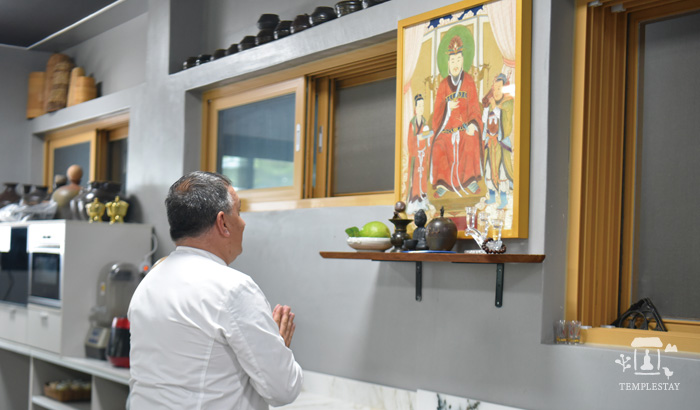
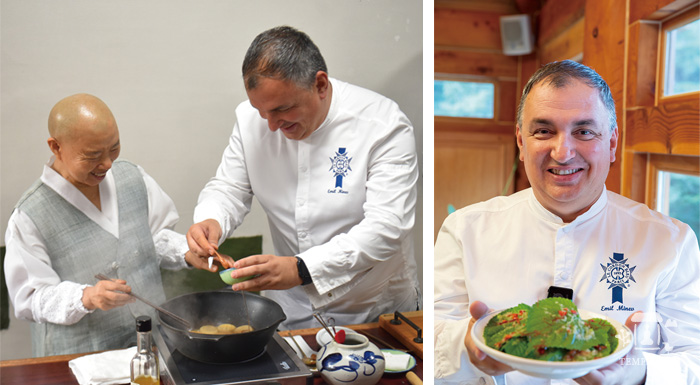
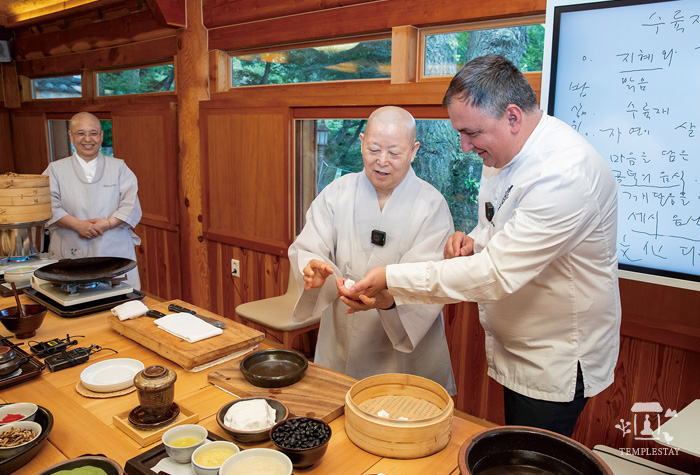
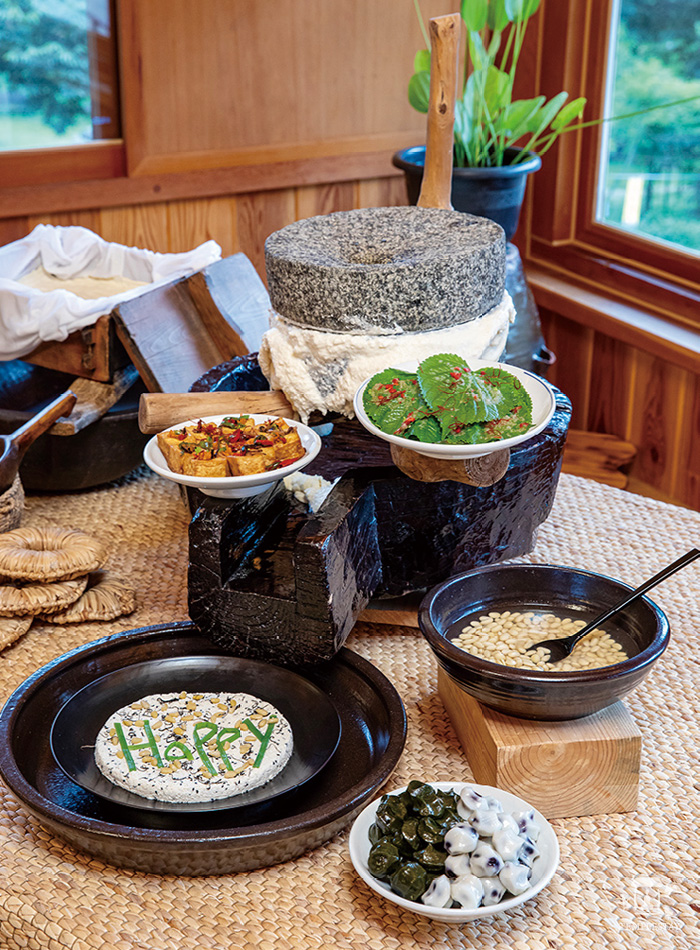
Ven. Jeong Kwan caught everyone’s attention by reinterpreting traditional temple food in a modern way. First, Ven. Jeong Kwan made temple food using seasonal ingredients: seasoned summer dureup (Korean angelica tree shoots), autumn stir-fried zucchini with Japanese ginger, dried persimmons and cucumbers seasoned with Korean chili paste, and steamed sweet pumpkin with root vegetables. While she was cooking, Chef Minev stood next to her and watched her closely, asking questions while tasting and smelling the food.
Among the available ingredients, Chef Minev chose omija (schisandra) syrup, bokbunja (Korean black raspberries) syrup, and king trumpet mushrooms.
After making his choices, the dish he cooked on the spot was braised king trumpet mushrooms with omija syrup. It was a scene where master cooks from different cultures understood and sympathized with each other’s cultures through different dishes using the same ingredients. He was deeply impressed by his experience at Baekyangsa Temple, a traditional Korean temple, and the temple food of Ven. Jeong Kwan, whom he met at Cheonjinam Hermitage, as well as her process of cooking.
The next day, Chef Minev visited Yeongseonsa Temple in Daejeon and met Ven. Beopsong, a temple food grade 1 artisan. Together, they made mung bean pancakes and seasoned nogak (overripe cucumber), recipes that have been passed down at Yeongseonsa Temple. Chef Minev personally prepared the vegetables while standing next to Ven. Beopsong, and seasoned them with natural ingredients according to her instructions. He smiled brightly and said, “It feels like I’ve gone back to when I first learned to cook 30 years ago. It’s a unique feeling.” Ven. Beopsong began teaching temple food at Le Cordon Bleu London in 2021, and has maintained a good relationship with Chef Minev.
Le Cordon Bleu London has been collaborating with the Corps on Korean temple food for the past four years. In particular, as part of the vegetarian curriculum, they run a program twice a year to introduce Korean temple food to their students.
Regarding this, Chef Minev said, “Not only have we graduated over 100 students so far, but many people from all over the world are interested and want to participate. The response has also been very good.” He added, “We have a great partnership with the temple food team of the Corps, and the Plant-Based Culinary Arts program in which the temple food team participates is a particularly popular and unique program.”
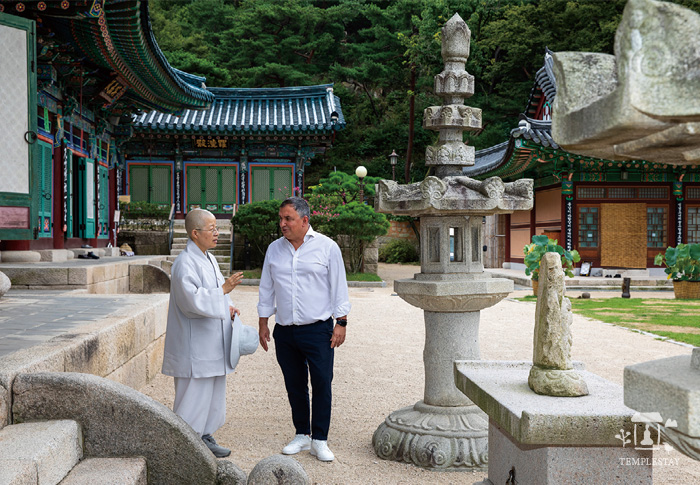
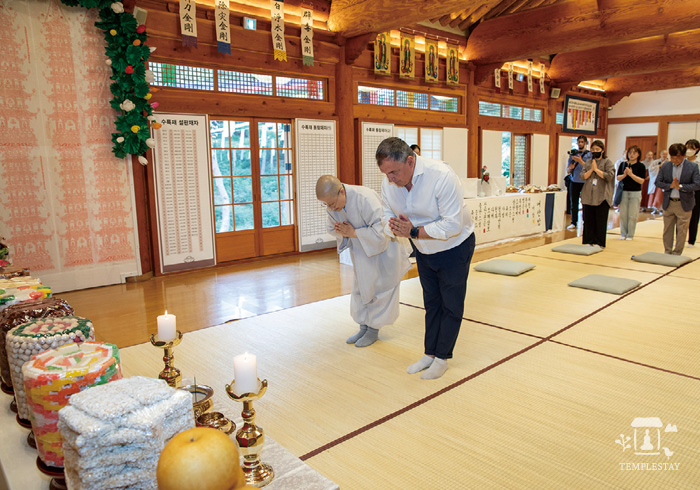
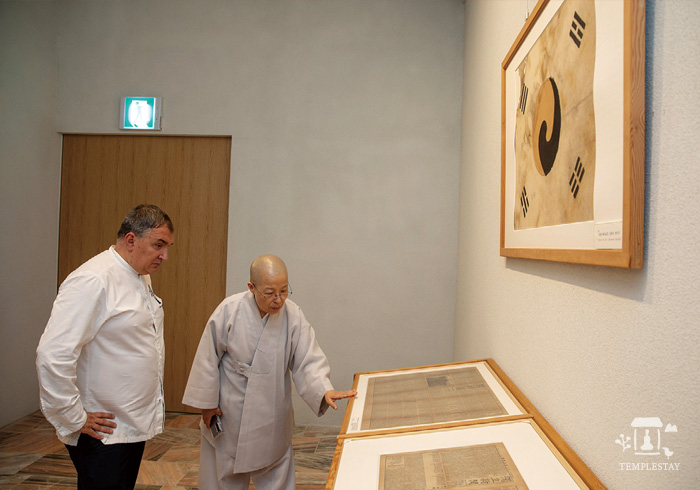
The last event on his schedule was held at Jinkwansa Temple on September 5th. There, Chef Minev also participated in the Suryukjae (Water and Land Ceremony), a traditional Korean Buddhist ritual.
He was particularly moved by the explanation that “Suryukjae is a Buddhist ceremony that comforts all living beings and prays for them to be reborn in paradise.” He then had time to learn about Buddhist practices that cultivate the mind through simple meditation.
Ven. Gyeho, the most eminent elder nun of Jinkwansa Temple and a temple food master, once again emphasized the significance of temple food.
In particular, regarding tofu, a food offered to accumulate merit at the Water and Land Ceremony, She explained the history of tofu that is made at Jinkwansa Temple, and the significance of Jinkwansa being designated a “Joposa” (temple in charge of making tofu).
The dishes presented by Ven. Gyeho that day were songpyeon (half-moon shaped rice cake with filling), tofu jangajji, and perilla leaf salad with pear. Chef Minev monitored the entire cooking process and asked in detail about the meaning of temple food.
Expressing sincere gratitude, he said, “Learning about temple food allowed me to learn about the process by which ingredients go from nature to the table,” and “Above all, I was impressed by her high level of understanding of the ingredients and the importance of their relationship to nature, and I was able to learn wisdom, compassion, and respect.”
Ven. Gyeho explained, “Temple food is food of merit, food of sharing, and food of giving,” and added, “I hope we can work together to teach temple food to the world.”
At this event, Ven. Gyeho presented to Chef Minev a set of baru (bowls used in a formal monastic meal), and he gave her a hat to express his respect for the talented chef.
Chef Minev has always had a keen interest in Korean temple food, but this was his first time experiencing the entire process of making temple food with a monastic at a traditional Korean temple. It was a very special and meaningful time.
He explained, “My first encounter with temple food was quite by chance. I was invited to a private dinner where kimchi was served, hosted by the Korean embassy at the time, and a monastic came and prepared a 20-course dinner of temple food.”
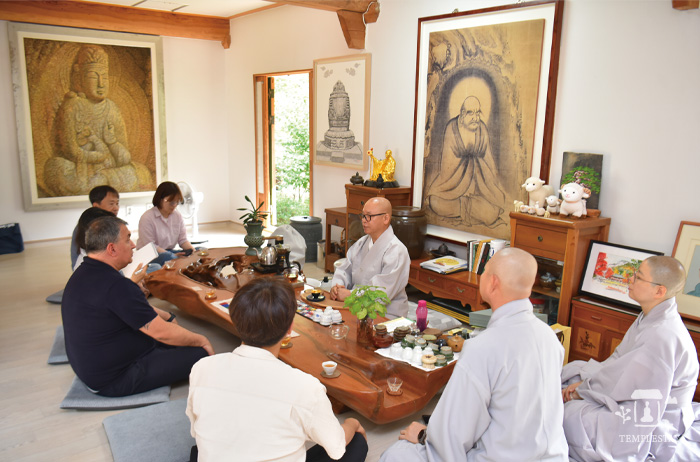
“It was so amazing. At that time, I only knew about a few Korean foods like Korean barbecue and kimchi, and I thought Korean food was spicy and had a lot of seasoning. But the temple food I had that day was very special. It was made without using the five pungent veggies (like garlic), but it was excellent and completely different from the food I had encountered before. For me, who had already been a chef for a long time, it was a very different and special experience.”
That experience later presented him the opportunity to start a collaboration with the temple food team of the Corps. He was convinced that “temple food has great potential.”
“Many people still don’t know about temple food. Especially when you say it’s vegan and doesn’t use any of five pungent veggies, most people wonder how you can cook it. However, if you look at the dining trends over the past five years through Le Cordon Bleu London’s master degree program, the most popular foods are vegetarian first and healthy second. Temple food has great potential because it is both of these.”
Meanwhile, the Corps is currently discussing holding a temple food-related event at the 130th anniversary of Le Cordon Bleu in 2025.





